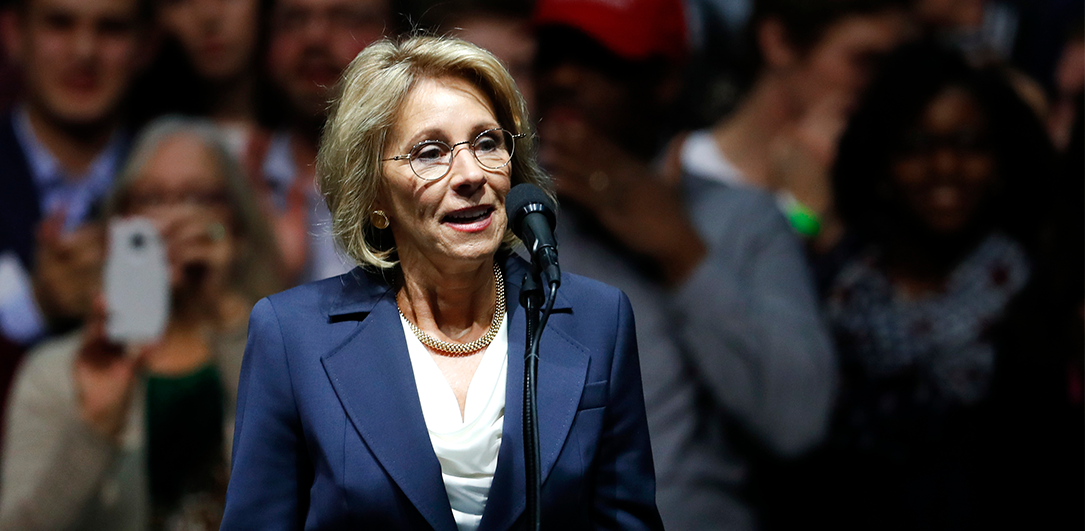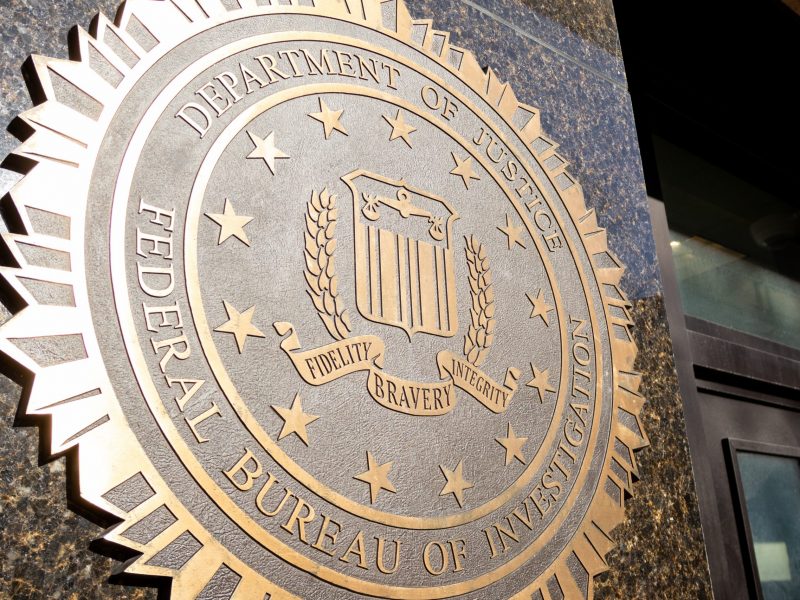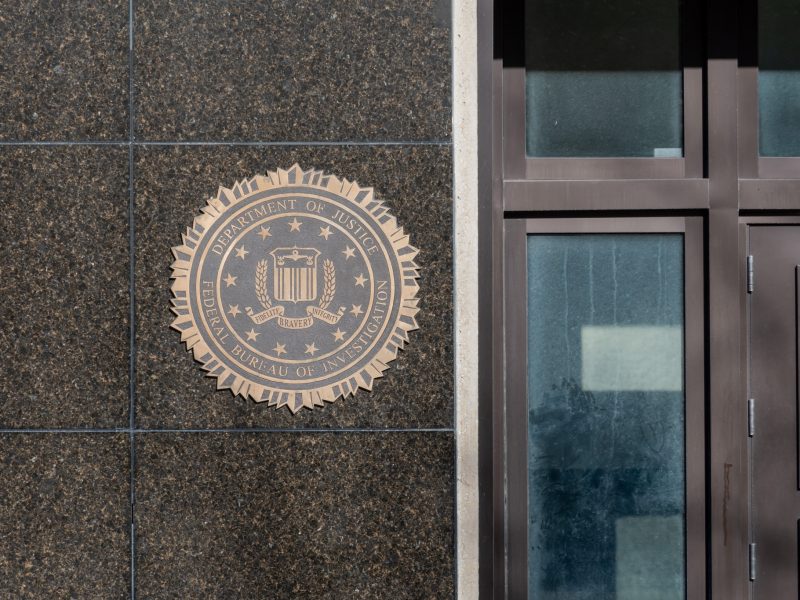About an hour before Vice President Mike Pence broke a U.S. Senate tie to secure Betsy DeVos as President Trump’s pick for education secretary, Democratic Maryland lawmakers announced a set of initiatives Tuesday to protect this state’s schools from federal influence.
Lawmakers and educators in the state are concerned that DeVos, Trump and Republican Gov. Larry Hogan will take steps to “privatize” the education system through voucher programs and conversion to charter schools — all at the expense of public schools and their students, said Steven Hershkowitz, a Maryland State Education Association spokesman. Vouchers aim to provide students in low-performing schools with funds to subsidize their tuition at private schools, while charter schools can be run by for-profit companies instead of government districts.
DeVos, a 59-year-old philanthropist who donated $22.5 million in 2010 to fund the University of Maryland’s DeVos Institute of Arts Management, faced criticism from Democrats and constituents after her Jan. 17 confirmation hearing where opponents said she stumbled over questions on accountability measures, guns in schools and other education policies. She also does not have prior experience in the education sector.
Though legislators such as Hogan have expressed support for charter schools and voucher programs as a means of providing wider education opportunities, opponents say both serve as a bandaid that fails to address achievement gaps and further segregates students by class and race.
“Now with Betsy DeVos being confirmed as U.S. Secretary of Education, there is a real threat to the nature of how education is delivered to students across the state,” Hershkowitz said. “… Every student deserves a high quality education no matter what background they come from … so the strategy that we put forward today had to do with making sure that our public schools are intact and they’re protected.”
In anticipation of DeVos’ confirmation, Democratic lawmakers introduced bills Tuesday to prevent these privatization efforts and to limit the emphasis on standardized testing in public schools. They also announced their opposition to Hogan’s education agenda and state budget that they said focuses on vouchers and charter schools.
Maryland’s Protect Our Schools Act would set guidelines for how this state will implement the 2015 Every Student Succeeds Act, a federal law that gives states flexibility in designing accountability systems for public schools, to prohibit the state from using any forms of privatization for low-performing schools, Hershkowitz said. The act also seeks to shift the focus away from standardized test performance and include other accountability metrics such as class size and a well-rounded curriculum.
Lawmakers also pledged Tuesday to fight a handful of Hogan’s education initiatives, including his Public Charter School Act of 2017 — which would create an independent charter school authority and grant charter schools certain exemptions from local law — and his plan to double funding for a voucher program that allows low-income students to attend private school.
Hogan has advocated for the expansion of charter schools and voucher programs to offer more choice for Maryland students and to improve access to high-quality education across the state. His Broadening Options and Opportunities for Students Today, or BOOST, program also provides scholarships to send low-income students to private schools. In his State of the State address last week, Hogan said, “We still have students who are trapped in persistently failing schools.”
Del. Eric Luedtke (D-Montgomery), a sponsor of the Protect Our Schools Act, said while private school vouchers and charter schools may benefit some students, these programs are not in the best interest of all students.
“The reality is that these proposals like that are sideshows to solving the fundamental issues in education, things like the achievement gap, and they can benefit some kids, but they won’t benefit the vast majority,” said Luedtke, who taught middle school social studies in Montgomery County for 10 years.
Luedtke is also sponsoring a bill that would limit standardized testing to 2 percent of a school year’s instructional time. This proposal — the Less Testing, More Learning Act — passed the House of Delegates last year but died in the Senate. Parents, teachers and students have raised concerns that excessive testing is taking time away from learning and instruction, Luedtke said.
While some argue that charter schools and vouchers can help students in low-performing schools, these programs have diverted money from public schools in other states without proof that these schools perform any better, said Gail Sunderman, director of the University of Maryland’s Maryland Equity Project.
These programs can also “stratify students” by class and race, Sunderman said, as private school vouchers don’t cover the full cost of tuition and charter schools can attract students and families who are already advantaged.
“It’s hard to tell at this early stage” how DeVos will affect education in the state and nationwide because, “It’s not clear how much she can just act unilaterally,” Sunderman said.
Democrats on Tuesday were able to sway some Republican senators to their side before Pence’s 50-50 vote tie break — the first time a vice president has been summoned to break a tie on a presidential cabinet nomination. Two Republican senators joined Democrats and Independents in opposing DeVos.
Trump tweeted before the vote that morning that, “Betsy DeVos is a reformer, and she is going to be a great Education Sec. for our kids!” Pence also tweeted that his vote to break the tie was “a vote for every child having a chance at a world-class education.”
Sens. Chris Van Hollen and Ben Cardin both voted against DeVos on Tuesday and spoke against her on the Senate floor Monday. Senate Democrats held the floor overnight Monday in a last-ditch effort to prevent DeVos’ confirmation.
“Our mission must be to provide every child, regardless of zip code, with access to a high quality neighborhood public school,” Van Hollen said. “… We can do a lot better for our kids.”
Freshman Paden Tranter said she was concerned that DeVos was not able to answer questions from senators during her confirmation hearing, and that DeVos “doesn’t really seem like she knows what she’s doing.”
“She didn’t go a public school, her kids didn’t go to a public school, so I mean I just don’t think she’s qualified,” the criminology and criminal justice major said, speaking before the final vote in the Senate. “It kind of scares me that she might be in charge of this without having any experience.”
Rachel Moskowitz, a sophomore elementary education major, said DeVos’ comments put her in a difficult place as an aspiring teacher.
“As somebody who wants to work in a public school, I don’t appreciate that when 50 million of our children are educated in public schools, she doesn’t believe in it,” Moskowitz said.
Maryland House and Senate committees will hold hearings on the Less Testing, More Learning Act in mid-February. Hearing dates for the Protect Our Schools Act have not yet been announced.
Staff writer Leah Brennan contributed to this article.



